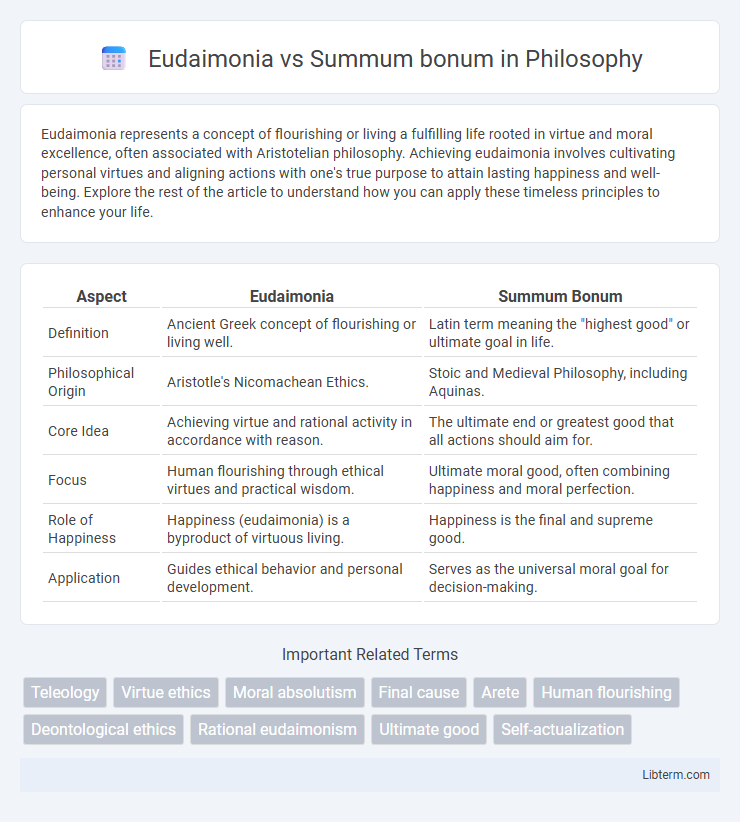Eudaimonia represents a concept of flourishing or living a fulfilling life rooted in virtue and moral excellence, often associated with Aristotelian philosophy. Achieving eudaimonia involves cultivating personal virtues and aligning actions with one's true purpose to attain lasting happiness and well-being. Explore the rest of the article to understand how you can apply these timeless principles to enhance your life.
Table of Comparison
| Aspect | Eudaimonia | Summum Bonum |
|---|---|---|
| Definition | Ancient Greek concept of flourishing or living well. | Latin term meaning the "highest good" or ultimate goal in life. |
| Philosophical Origin | Aristotle's Nicomachean Ethics. | Stoic and Medieval Philosophy, including Aquinas. |
| Core Idea | Achieving virtue and rational activity in accordance with reason. | The ultimate end or greatest good that all actions should aim for. |
| Focus | Human flourishing through ethical virtues and practical wisdom. | Ultimate moral good, often combining happiness and moral perfection. |
| Role of Happiness | Happiness (eudaimonia) is a byproduct of virtuous living. | Happiness is the final and supreme good. |
| Application | Guides ethical behavior and personal development. | Serves as the universal moral goal for decision-making. |
Defining Eudaimonia: Origins and Meaning
Eudaimonia, a key concept in Aristotelian ethics, originates from ancient Greek philosophy and is often translated as "human flourishing" or "living well." It signifies an ideal state of being characterized by virtuous activity aligned with reason, representing the highest human good achievable through personal and moral excellence. Unlike summum bonum, which broadly denotes the ultimate good in ethical theory, eudaimonia emphasizes a dynamic process of fulfilling one's potential and living a meaningful, virtuous life.
Understanding Summum Bonum: The Highest Good
Summum bonum, translating to "the highest good," represents the ultimate end or greatest value in ethical philosophy, often associated with moral perfection and complete happiness. It serves as the ultimate goal that unifies all other virtues and goods, providing a framework for ethical decision-making and human flourishing. Understanding Summum bonum involves recognizing its role as the intrinsic ultimate aim that guides virtuous actions toward achieving the greatest possible fulfillment in life.
Historical Roots: Greek vs. Roman Philosophy
Eudaimonia, rooted in Greek philosophy, particularly Aristotle's Nicomachean Ethics, refers to human flourishing achieved through virtuous living and rational activity in accordance with one's true nature. Summum bonum, prominent in Roman philosophy and later developed by Cicero and Stoic thinkers, denotes the highest or ultimate good that integrates moral virtue with practical wisdom and the pursuit of a harmonious life. The historical divergence highlights Greek emphasis on individual excellence and fulfillment, while Roman thought prioritizes social duty and collective well-being as central to the ultimate good.
Key Philosophers and Their Views
Aristotle's concept of Eudaimonia emphasizes flourishing through virtuous activity aligned with reason, representing the highest human good achieved by living a balanced and fulfilled life. In contrast, the Summum Bonum, prominent in the works of Cicero and later Immanuel Kant, denotes the supreme good as the ultimate end that combines virtue and happiness in a moral framework, prioritizing duty and moral law. Kant's interpretation links the Summum Bonum to the harmony of virtue and happiness in a postulates of practical reason, highlighting the moral obligation beyond empirical happiness.
Eudaimonia in Aristotle’s Ethics
Eudaimonia in Aristotle's Ethics represents the highest human good, defined as flourishing through virtuous activity in accordance with reason over a complete life. Aristotle distinguishes eudaimonia from summum bonum by emphasizing practical virtue and moral character as essential to achieving true happiness. This concept underpins his virtue ethics, highlighting the development of intellectual and moral virtues as pathways to fulfilling human potential.
Summum Bonum in Stoicism and Christianity
Summum bonum in Stoicism represents the highest good as living in accordance with nature and reason, emphasizing virtue as the sole intrinsic good that leads to tranquility and freedom from passions. In Christianity, summum bonum centers on union with God and eternal life through divine grace, where moral goodness aligns with God's will and love as the ultimate fulfillment of human purpose. While both traditions regard summum bonum as the pinnacle of moral aspiration, Stoicism is grounded in rational self-mastery, whereas Christianity focuses on faith and divine relationship.
Core Differences Between Eudaimonia and Summum Bonum
Eudaimonia, rooted in Aristotelian ethics, emphasizes flourishing through virtuous living and fulfilling one's potential, while Summum bonum represents the highest good or ultimate end in philosophical and theological traditions. Eudaimonia relates to personal well-being and moral excellence achieved through practical wisdom and habits, whereas Summum bonum encompasses an absolute value or ultimate purpose that may transcend individual experience. The core difference lies in Eudaimonia's focus on human fulfillment and ethical development, contrasted with Summum bonum's broader, often metaphysical ideal of the greatest possible good.
Similarities and Intersections
Eudaimonia and Summum bonum both represent the highest good in classical ethical philosophy, emphasizing human flourishing and ultimate happiness as central aims. They intersect in their pursuit of a well-lived life characterized by virtue, moral excellence, and fulfillment of one's true nature. Both concepts serve as guiding principles in Aristotelian and Stoic ethics, highlighting the integration of ethical living and personal well-being.
Modern Interpretations and Relevance
Modern interpretations of Eudaimonia emphasize flourishing through psychological well-being, personal growth, and authentic happiness, integrating positive psychology and virtue ethics. Summum bonum, traditionally the highest good in moral philosophy, is now often viewed through pluralistic lenses, considering diverse values like justice, autonomy, and collective well-being. Contemporary relevance lies in applying these frameworks to ethics, mental health, and public policy, promoting holistic human flourishing and societal harmony.
Choosing a Path: Practical Implications Today
Eudaimonia, rooted in Aristotelian ethics, emphasizes living in accordance with virtue to achieve human flourishing and long-term well-being. Summum bonum, the highest good in philosophical traditions such as Kantian ethics, represents the ultimate moral goal that guides ethical decision-making. Choosing a path today involves balancing practical virtues that foster personal growth with adherence to universal moral principles that promote collective good.
Eudaimonia Infographic

 libterm.com
libterm.com